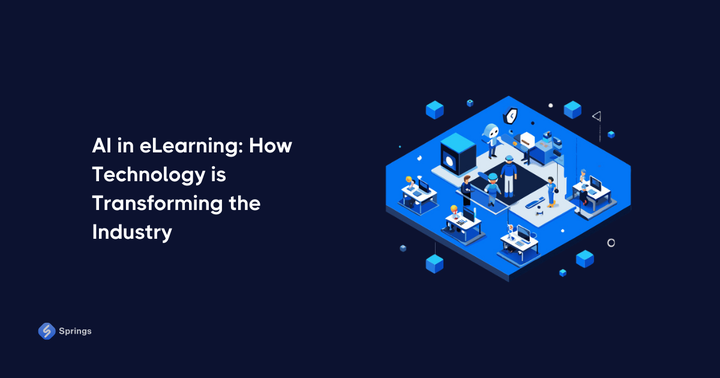How Technology is Transforming the Industry

These figures illustrate the robust growth trajectory of the AI in eLearning market, the increasing adoption of AI tools, and the diverse applications of AI in educational settings.
AI in eLearning: Most Common Use Cases
Large Language Models like ChatGPT and Gemini have opened up new possibilities for eLearning platforms. Here are some popular and promising ways AI can transform online learning:
Intelligent Tutoring
There is a simulation system that reproduces human behavior in the learning process and provides feedback that is person-touched for a certain student. Intelligent Tutoring Systems use machine learning and natural language processing which analyze students’ performance for improvement. There are a few options to interact with Intelligent Tutoring Systems: conversation or other media.
Automated Grader
If we need to optimize the valuable time of tutors, here we go with AI/ML development which helps to automate the evaluation process. It can be done with different options like assessment, questionnaire, and so on. LMS companies try hard to train the models to define improvement areas or mistakes with fantastic accuracy, so the tutors can be focused on unique and individual approaches by providing feedback.
Chatbots and Assistants
When students need ongoing feedback anywhere they are and whenever they study the chatbots can handle it. Tech support, providing education content, answering questions or so – this is easy work for chatbots or assistants. For sure, these chatbots automatically define what a student is currently doing and should provide proper info accordingly.
Adaptive Learning
Based on analytics of students’ performance adaptive learning uses AI for personalizing and adjusting educational content. So, the level of learning could be set up based on performance. A perfect way to optimize learning paths in dynamic for higher efficiency.
Predictive Analytics
One more great feature that helps to analyze the student’s studying behavior and foresee the potential performance. Predictive Analytics could be a helpful feature for choosing who can be the best student, or who needs to make better and optimize the structure of the course.
AI For eLearning: Real Examples
AI-powered eLearning tools have been already integrated into worldwide enterprises and huge corporations. Let’s have a look at the samples.
McDonald’s
McDonald’s has integrated AI into its training programs with the launch of Archways to Opportunity, an AI-powered voice assistant. This tool analyzes employee performance to pinpoint strengths and areas for improvement. By doing so, it provides personalized training modules that cater specifically to each employee’s needs. This system not only helps in enhancing skills but also in maintaining a high standard of service and operational efficiency across McDonald’s outlets worldwide.
H&R Block
H&R Block employs an AI-based chatbot named Block Advisors to support and train its workforce. Utilizing natural language processing, the chatbot can interpret and respond to employee inquiries regarding tax preparation. This real-time assistance ensures that employees can access accurate and up-to-date information quickly, enhancing their ability to serve clients effectively. The AI-driven support helps streamline the training process and ensures consistency in the quality of service provided.
Hilton Hotels
Hilton Hotels has developed Hilton University, an AI-based learning platform designed to provide continuous education to its employees. The platform allows staff to access training materials and educational resources anytime, anywhere. This flexibility supports the diverse needs of Hilton’s global workforce, ensuring that employees can pursue professional development opportunities without disrupting their work schedules. The AI system adapts the learning content to the individual’s progress, ensuring efficient and effective learning.
Ford
Ford has introduced an AI-based training platform known as FordPass, specifically aimed at enhancing the skills of its service technicians. The platform uses AI to interpret data from vehicle diagnostics, helping technicians to better understand and resolve issues. This targeted training improves the accuracy and speed of repairs, leading to higher customer satisfaction. By leveraging AI, Ford ensures that its technicians are well-equipped to handle the complexities of modern automotive technology.
Duolingo
Duolingo utilizes AI to create a highly personalized language learning experience. The platform adapts to the user’s learning style, strengths, and weaknesses, offering customized lessons that optimize the learning process. Duolingo’s AI capabilities include natural language processing to simulate real-life conversations through chatbots, providing users with practical language practice. This interactive approach helps learners build confidence and proficiency in new languages more effectively.
Thinkster
Thinkster combines AI with human tutoring to provide personalized math education for K–8 students. The AI component analyzes each student’s performance, adjusting the difficulty and type of questions based on their progress. This personalized approach helps keep students engaged and challenged at an appropriate level. Additionally, real tutors review the AI’s feedback and provide targeted support, creating a blended learning environment that maximizes student outcomes.
Querium
Querium’s virtual tutoring system focuses on STEM education, using AI to monitor and analyze the steps students take when solving problems. The AI provides immediate feedback, highlighting errors and guiding students toward the correct methods. This instant feedback helps prevent the reinforcement of incorrect techniques and reduces the burden on teachers by automating routine assessments. The system ensures that students receive consistent and accurate guidance, enhancing their learning experience.
Alta by Knewton
Alta by Knewton offers an adaptive learning platform that identifies knowledge gaps and provides tailored content to fill those gaps. This AI-driven approach ensures that learners receive the most relevant and effective study materials, improving their understanding and retention of information. Alta’s system continuously updates and refines the learning content based on the learner’s progress, making it a powerful tool for ongoing education and professional development. This adaptability makes it particularly useful for companies aiming to keep their training programs current and effective.
Challenges of adopting AI in e-Learning
The integration of generative AI into educational settings presents numerous challenges alongside its potential benefits. While AI tools can enhance learning experiences, their misuse or overreliance may impede critical thinking and creativity. A primary concern is that students might use AI to complete assignments without engaging deeply with the material, thus hindering their cognitive development.
link





